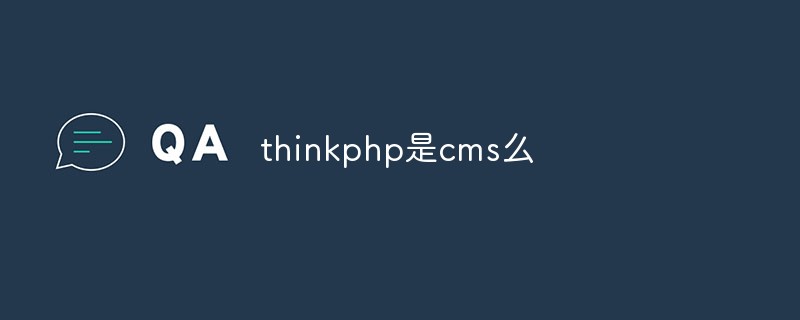
thinkphp is not cms. thinkphp and cms are different concepts. thinkphp is a framework for PHP program development, used to simplify enterprise-level application development and agile WEB application development; while cms refers to the content management system, which is a finished PHP program.

The operating environment of this tutorial: Windows 7 system, thinkphp v5.1 version, Dell G3 computer.
thinkphp is not cms. The two are different concepts.
ThinkPHP is a PHP development framework, a framework used for PHP program development, used to simplify enterprise-level application development and agile WEB application development.
CMS means "content management system" in Chinese, and it is a PHP finished program.
The relationship between thinkphp and cms is that CMS development can use the ThinkPHP framework, or other frameworks, such as Zend, Yii, CodeIgniter, CakePHP, etc.
Introduction to ThinkPHP
Using ThinkPHP, you can develop and deploy applications more conveniently and quickly. Of course, it is not just enterprise-level applications. Any PHP application development can be started from Benefit from the simplicity, compatibility and speed of ThinkPHP.
Main features of ThinkPHP:
Specifications: Follow PSR-2, PSR-4 specifications, Composer and unit test support;
Rigorous: Extremely rigorous error detection and security mechanisms, detailed log information, to protect your development;
Flexible: Reduce core dependencies, make expansion more flexible and convenient, Supports command line instruction expansion;
API friendly: excellent performance and REST support, remote debugging, better support for API development;
Efficient: lazy loading, and caching mechanism for routing, configuration and automatic loading;
ORM: reconstructed database, model and association, supported by MongoDb;
Simplicity, speed and practicality are the tenets of ThinkPHP development. For this reason, ThinkPHP will continue to absorb and integrate better technologies to ensure its freshness and vitality, and provide the best practices for WEB application development!
ThinkPHP can support server environments such as windows/Unix/Linux. The official version requires PHP5.0 or above. It supports MySql, PgSQL, Sqlite databases and PDO extensions. The ThinkPHP framework itself has no special module requirements. The specific application system operating environment requirements depend on the modules involved in development.
As an overall development solution, ThinkPHP can solve most needs in application development, because it includes the underlying architecture, compatibility processing, base class library, database access layer, template engine, caching mechanism, and plug-ins Mechanism, role authentication, form processing and other commonly used components, and it is more convenient for cross-version, cross-platform and cross-database transplantation. And each component is carefully designed and perfected, and the application development process only needs to focus on your business logic.
cms introduction
cms is an integrated web management system used to publish network content. CMS systems mainly have two types of functions, one is to build websites, and the other is used to manage and publish content.
1. About building a website
Building a website is the main purpose of CMS. Why should you use CMS to build it?
Because it is very convenient and fast to build a website with CMS. CMS generally supports modular website building, and the construction work can be completed without technical personnel. There is no threshold. If there is a need to build a website, even if you are not a professional, you can It can be completed in a short time, and if you want to modify and update the website, it is also very easy. You only need to modify the relevant modules in the background, confirm and save, and then go online.
2. About publishing and managing content
First of all, CMS usually has a membership system to grade the permissions of each user. For example, the super administrator has the highest permissions and can see The complete backend and the use of all functions; the editor's permissions will be relatively small, and can only see and use some functions of the backend, such as only editing, modifying articles, and submitting articles to the editor-in-chief for review, etc.
If you want to publish an article and display it on the website, the relevant personnel need to log in to a visual operation interface in the background. Generally, there will be a rich text editor. In addition to visually editing the article, you can also plug in various pictures and videos, etc. A more complete CMS also supports classifying, sorting, tagging articles, adding article sources, displaying authors, comment areas, etc. After the editor saves the article, it can be managed uniformly in the background. Upload to website with one click.
[Related tutorial recommendations: thinkphp framework]
The above is the detailed content of Is thinkphp cms?. For more information, please follow other related articles on the PHP Chinese website!
 Which one is easier, thinkphp or laravel?
Which one is easier, thinkphp or laravel?
 How is the performance of thinkphp?
How is the performance of thinkphp?
 What to do if the login token is invalid
What to do if the login token is invalid
 Is Huawei's Hongmeng OS Android?
Is Huawei's Hongmeng OS Android?
 How to solve the problem that the print processor does not exist
How to solve the problem that the print processor does not exist
 What are the common tomcat vulnerabilities?
What are the common tomcat vulnerabilities?
 Solution to socket error 10054
Solution to socket error 10054
 Formal digital currency trading platform
Formal digital currency trading platform